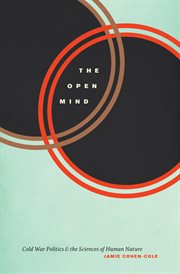Nonfiction
eBook
Details
PUBLISHED
Made available through hoopla
DESCRIPTION
1 online resource
ISBN/ISSN
LANGUAGE
NOTES
This study chronicles the rise of psychology as a tool for social analysis during the Cold War Era and the concept of the open mind in American culture. In the years following World War II, a scientific vision of the rational, creative, and autonomous self took hold as an essential way of understanding society. In The Open Mind, science historian Jamie Cohen-Cole demonstrates how this notion of the self became a defining feature of Cold War culture. From 1945 to 1965, policy makers used this new concept of human nature to advance a centrist political agenda and instigate nationwide educational reforms that promoted more open, and indeed more human, minds. The new field of cognitive science was central to this project, helping to overthrow the behaviorist view that the mind either did not exist or could not be studied scientifically. While the concept of the open mind initially unified American culture, this unity started to fracture between 1965 and 1975, as the ties between political centrism and the scientific account of human nature began to unravel. During the late 1960s, feminists and the New Left repurposed psychological tools to redefine open-mindedness as a characteristic of left-wing politics. As a result, once-liberal intellectuals became neoconservative, and in the early 1970s, struggles against open-mindedness gave energy and purpose to the right wing
Mode of access: World Wide Web







